A Comprehensive Analysis of Ethical Considerations for Accountants
VerifiedAdded on 2020/05/16
|8
|1583
|50
Essay
AI Summary
This essay provides a comprehensive analysis of the ethical considerations for accountants. It begins by defining ethics and its importance in the financial field. The discussion section explores key principles such as integrity, emphasizing the need for transparency and honesty in handling financial resources, and the consequences of unethical behavior. It also examines the importance of independence and non-discrimination, highlighting the need for objectivity and impartiality in financial undertakings. The essay further addresses the critical role of confidentiality, emphasizing the significance of secrecy and discretion in handling client information. The conclusion reiterates the importance of ethical decision-making and the availability of resources for accountants facing ethical dilemmas, underscoring the need for maintaining ethical standards to ensure the integrity of the profession. The essay uses the views of different authors to support the arguments and provide a comprehensive overview of the ethical landscape in accountancy.
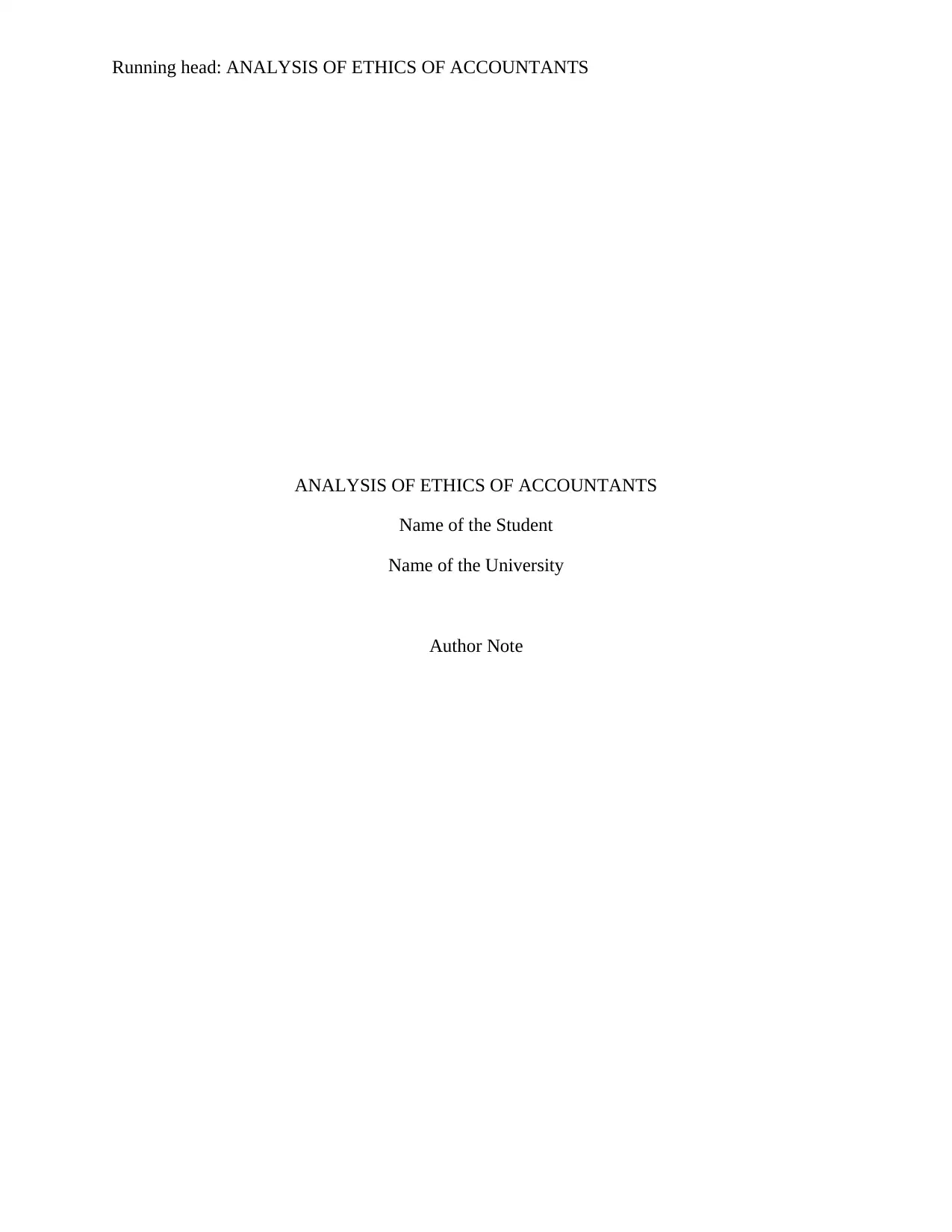
Running head: ANALYSIS OF ETHICS OF ACCOUNTANTS
ANALYSIS OF ETHICS OF ACCOUNTANTS
Name of the Student
Name of the University
Author Note
ANALYSIS OF ETHICS OF ACCOUNTANTS
Name of the Student
Name of the University
Author Note
Paraphrase This Document
Need a fresh take? Get an instant paraphrase of this document with our AI Paraphraser
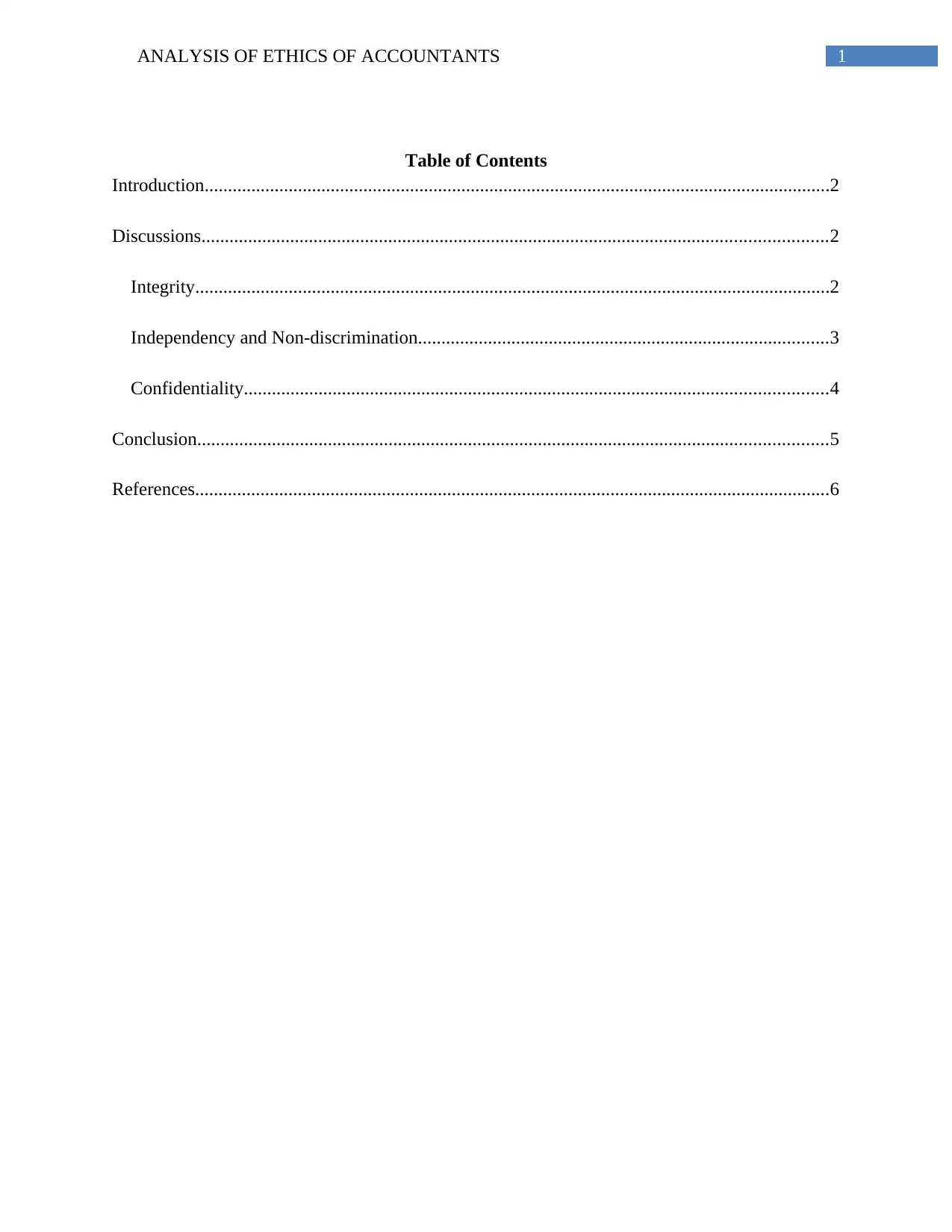
1ANALYSIS OF ETHICS OF ACCOUNTANTS
Table of Contents
Introduction......................................................................................................................................2
Discussions......................................................................................................................................2
Integrity........................................................................................................................................2
Independency and Non-discrimination........................................................................................3
Confidentiality.............................................................................................................................4
Conclusion.......................................................................................................................................5
References........................................................................................................................................6
Table of Contents
Introduction......................................................................................................................................2
Discussions......................................................................................................................................2
Integrity........................................................................................................................................2
Independency and Non-discrimination........................................................................................3
Confidentiality.............................................................................................................................4
Conclusion.......................................................................................................................................5
References........................................................................................................................................6
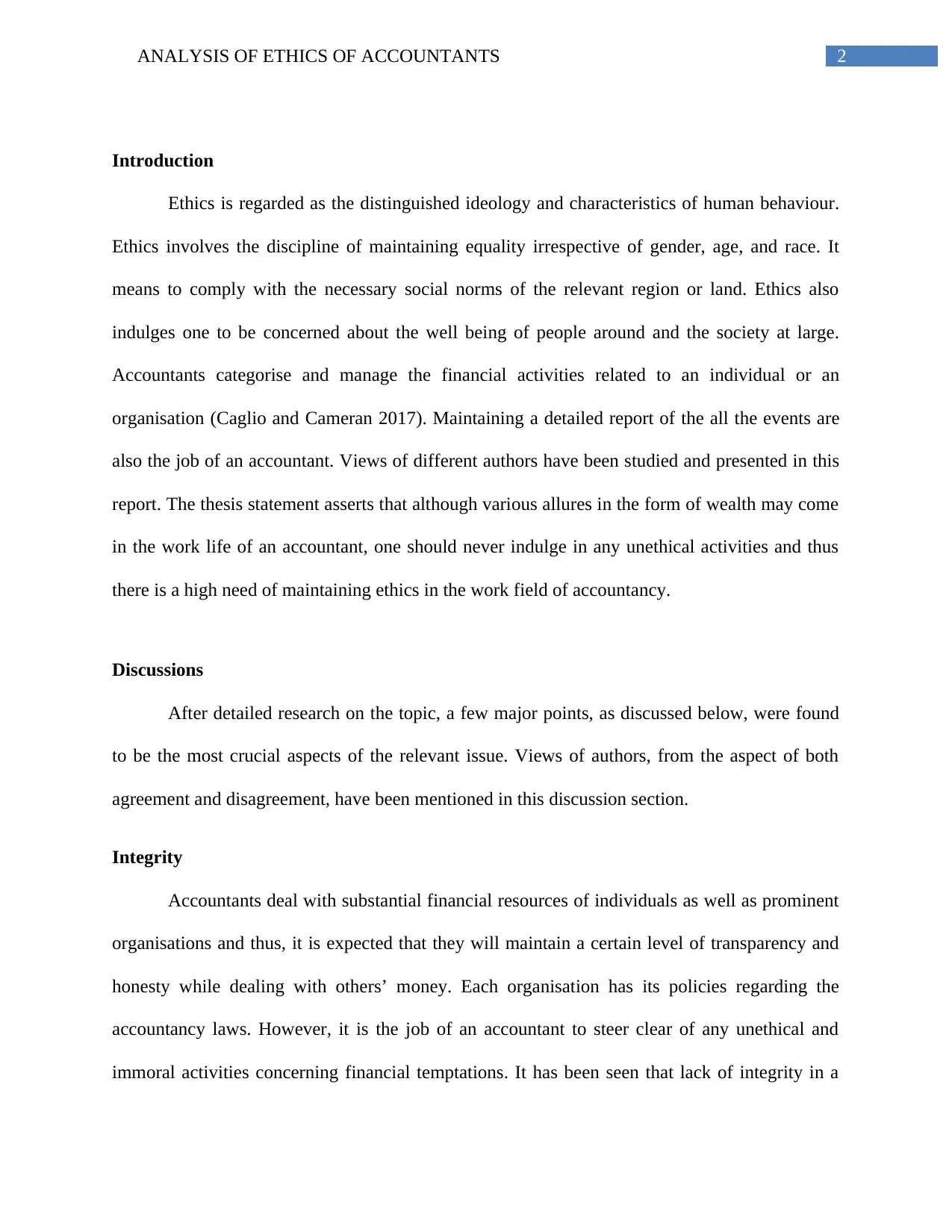
2ANALYSIS OF ETHICS OF ACCOUNTANTS
Introduction
Ethics is regarded as the distinguished ideology and characteristics of human behaviour.
Ethics involves the discipline of maintaining equality irrespective of gender, age, and race. It
means to comply with the necessary social norms of the relevant region or land. Ethics also
indulges one to be concerned about the well being of people around and the society at large.
Accountants categorise and manage the financial activities related to an individual or an
organisation (Caglio and Cameran 2017). Maintaining a detailed report of the all the events are
also the job of an accountant. Views of different authors have been studied and presented in this
report. The thesis statement asserts that although various allures in the form of wealth may come
in the work life of an accountant, one should never indulge in any unethical activities and thus
there is a high need of maintaining ethics in the work field of accountancy.
Discussions
After detailed research on the topic, a few major points, as discussed below, were found
to be the most crucial aspects of the relevant issue. Views of authors, from the aspect of both
agreement and disagreement, have been mentioned in this discussion section.
Integrity
Accountants deal with substantial financial resources of individuals as well as prominent
organisations and thus, it is expected that they will maintain a certain level of transparency and
honesty while dealing with others’ money. Each organisation has its policies regarding the
accountancy laws. However, it is the job of an accountant to steer clear of any unethical and
immoral activities concerning financial temptations. It has been seen that lack of integrity in a
Introduction
Ethics is regarded as the distinguished ideology and characteristics of human behaviour.
Ethics involves the discipline of maintaining equality irrespective of gender, age, and race. It
means to comply with the necessary social norms of the relevant region or land. Ethics also
indulges one to be concerned about the well being of people around and the society at large.
Accountants categorise and manage the financial activities related to an individual or an
organisation (Caglio and Cameran 2017). Maintaining a detailed report of the all the events are
also the job of an accountant. Views of different authors have been studied and presented in this
report. The thesis statement asserts that although various allures in the form of wealth may come
in the work life of an accountant, one should never indulge in any unethical activities and thus
there is a high need of maintaining ethics in the work field of accountancy.
Discussions
After detailed research on the topic, a few major points, as discussed below, were found
to be the most crucial aspects of the relevant issue. Views of authors, from the aspect of both
agreement and disagreement, have been mentioned in this discussion section.
Integrity
Accountants deal with substantial financial resources of individuals as well as prominent
organisations and thus, it is expected that they will maintain a certain level of transparency and
honesty while dealing with others’ money. Each organisation has its policies regarding the
accountancy laws. However, it is the job of an accountant to steer clear of any unethical and
immoral activities concerning financial temptations. It has been seen that lack of integrity in a
⊘ This is a preview!⊘
Do you want full access?
Subscribe today to unlock all pages.

Trusted by 1+ million students worldwide
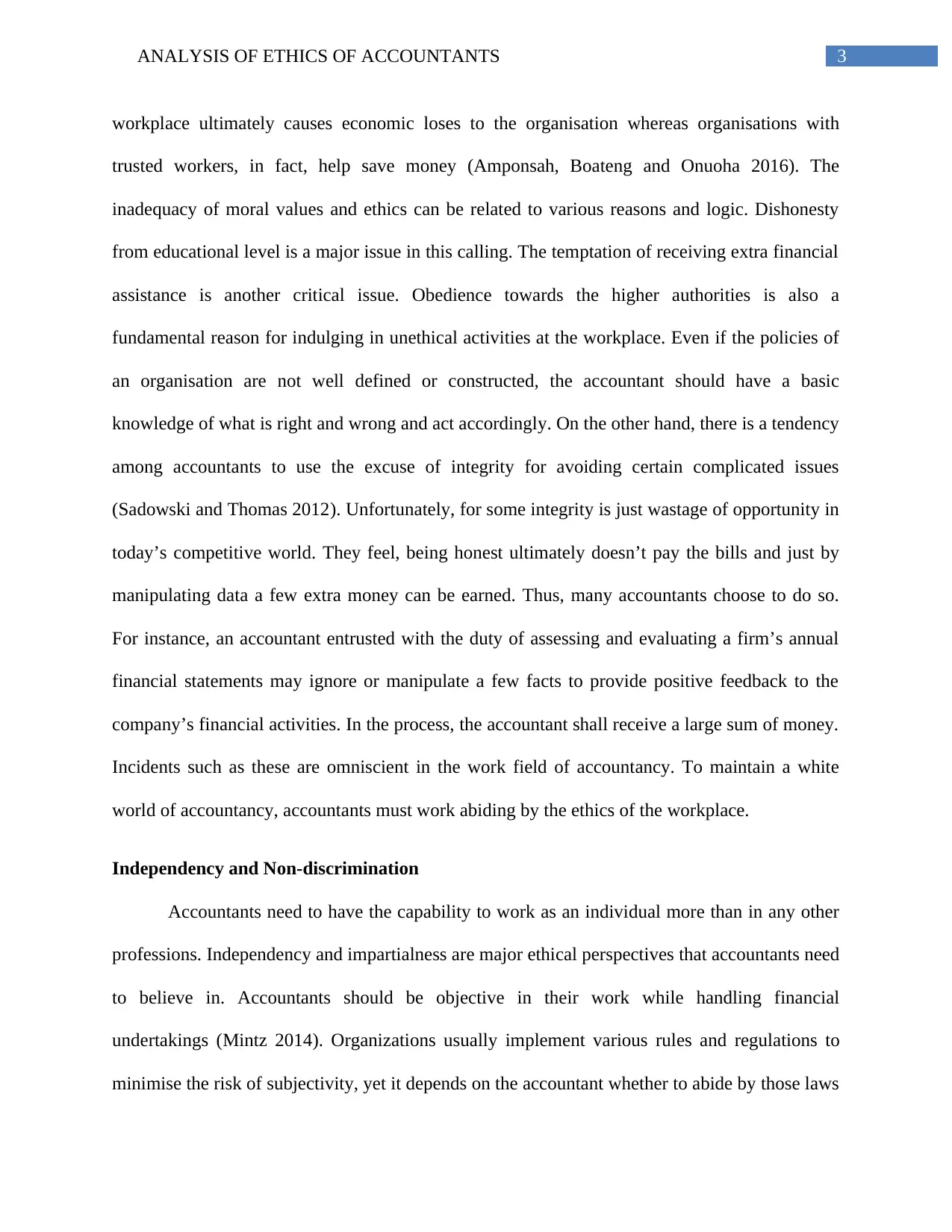
3ANALYSIS OF ETHICS OF ACCOUNTANTS
workplace ultimately causes economic loses to the organisation whereas organisations with
trusted workers, in fact, help save money (Amponsah, Boateng and Onuoha 2016). The
inadequacy of moral values and ethics can be related to various reasons and logic. Dishonesty
from educational level is a major issue in this calling. The temptation of receiving extra financial
assistance is another critical issue. Obedience towards the higher authorities is also a
fundamental reason for indulging in unethical activities at the workplace. Even if the policies of
an organisation are not well defined or constructed, the accountant should have a basic
knowledge of what is right and wrong and act accordingly. On the other hand, there is a tendency
among accountants to use the excuse of integrity for avoiding certain complicated issues
(Sadowski and Thomas 2012). Unfortunately, for some integrity is just wastage of opportunity in
today’s competitive world. They feel, being honest ultimately doesn’t pay the bills and just by
manipulating data a few extra money can be earned. Thus, many accountants choose to do so.
For instance, an accountant entrusted with the duty of assessing and evaluating a firm’s annual
financial statements may ignore or manipulate a few facts to provide positive feedback to the
company’s financial activities. In the process, the accountant shall receive a large sum of money.
Incidents such as these are omniscient in the work field of accountancy. To maintain a white
world of accountancy, accountants must work abiding by the ethics of the workplace.
Independency and Non-discrimination
Accountants need to have the capability to work as an individual more than in any other
professions. Independency and impartialness are major ethical perspectives that accountants need
to believe in. Accountants should be objective in their work while handling financial
undertakings (Mintz 2014). Organizations usually implement various rules and regulations to
minimise the risk of subjectivity, yet it depends on the accountant whether to abide by those laws
workplace ultimately causes economic loses to the organisation whereas organisations with
trusted workers, in fact, help save money (Amponsah, Boateng and Onuoha 2016). The
inadequacy of moral values and ethics can be related to various reasons and logic. Dishonesty
from educational level is a major issue in this calling. The temptation of receiving extra financial
assistance is another critical issue. Obedience towards the higher authorities is also a
fundamental reason for indulging in unethical activities at the workplace. Even if the policies of
an organisation are not well defined or constructed, the accountant should have a basic
knowledge of what is right and wrong and act accordingly. On the other hand, there is a tendency
among accountants to use the excuse of integrity for avoiding certain complicated issues
(Sadowski and Thomas 2012). Unfortunately, for some integrity is just wastage of opportunity in
today’s competitive world. They feel, being honest ultimately doesn’t pay the bills and just by
manipulating data a few extra money can be earned. Thus, many accountants choose to do so.
For instance, an accountant entrusted with the duty of assessing and evaluating a firm’s annual
financial statements may ignore or manipulate a few facts to provide positive feedback to the
company’s financial activities. In the process, the accountant shall receive a large sum of money.
Incidents such as these are omniscient in the work field of accountancy. To maintain a white
world of accountancy, accountants must work abiding by the ethics of the workplace.
Independency and Non-discrimination
Accountants need to have the capability to work as an individual more than in any other
professions. Independency and impartialness are major ethical perspectives that accountants need
to believe in. Accountants should be objective in their work while handling financial
undertakings (Mintz 2014). Organizations usually implement various rules and regulations to
minimise the risk of subjectivity, yet it depends on the accountant whether to abide by those laws
Paraphrase This Document
Need a fresh take? Get an instant paraphrase of this document with our AI Paraphraser
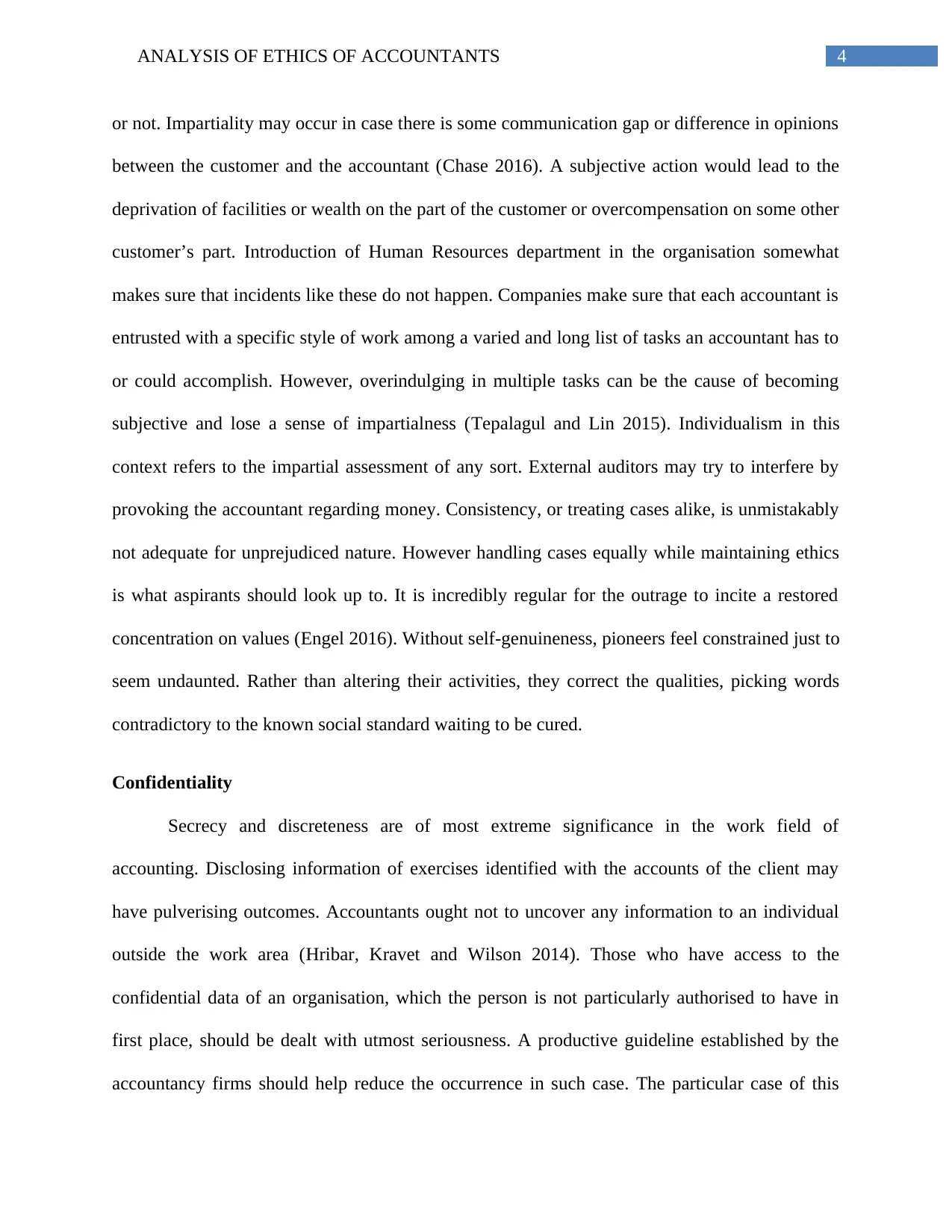
4ANALYSIS OF ETHICS OF ACCOUNTANTS
or not. Impartiality may occur in case there is some communication gap or difference in opinions
between the customer and the accountant (Chase 2016). A subjective action would lead to the
deprivation of facilities or wealth on the part of the customer or overcompensation on some other
customer’s part. Introduction of Human Resources department in the organisation somewhat
makes sure that incidents like these do not happen. Companies make sure that each accountant is
entrusted with a specific style of work among a varied and long list of tasks an accountant has to
or could accomplish. However, overindulging in multiple tasks can be the cause of becoming
subjective and lose a sense of impartialness (Tepalagul and Lin 2015). Individualism in this
context refers to the impartial assessment of any sort. External auditors may try to interfere by
provoking the accountant regarding money. Consistency, or treating cases alike, is unmistakably
not adequate for unprejudiced nature. However handling cases equally while maintaining ethics
is what aspirants should look up to. It is incredibly regular for the outrage to incite a restored
concentration on values (Engel 2016). Without self-genuineness, pioneers feel constrained just to
seem undaunted. Rather than altering their activities, they correct the qualities, picking words
contradictory to the known social standard waiting to be cured.
Confidentiality
Secrecy and discreteness are of most extreme significance in the work field of
accounting. Disclosing information of exercises identified with the accounts of the client may
have pulverising outcomes. Accountants ought not to uncover any information to an individual
outside the work area (Hribar, Kravet and Wilson 2014). Those who have access to the
confidential data of an organisation, which the person is not particularly authorised to have in
first place, should be dealt with utmost seriousness. A productive guideline established by the
accountancy firms should help reduce the occurrence in such case. The particular case of this
or not. Impartiality may occur in case there is some communication gap or difference in opinions
between the customer and the accountant (Chase 2016). A subjective action would lead to the
deprivation of facilities or wealth on the part of the customer or overcompensation on some other
customer’s part. Introduction of Human Resources department in the organisation somewhat
makes sure that incidents like these do not happen. Companies make sure that each accountant is
entrusted with a specific style of work among a varied and long list of tasks an accountant has to
or could accomplish. However, overindulging in multiple tasks can be the cause of becoming
subjective and lose a sense of impartialness (Tepalagul and Lin 2015). Individualism in this
context refers to the impartial assessment of any sort. External auditors may try to interfere by
provoking the accountant regarding money. Consistency, or treating cases alike, is unmistakably
not adequate for unprejudiced nature. However handling cases equally while maintaining ethics
is what aspirants should look up to. It is incredibly regular for the outrage to incite a restored
concentration on values (Engel 2016). Without self-genuineness, pioneers feel constrained just to
seem undaunted. Rather than altering their activities, they correct the qualities, picking words
contradictory to the known social standard waiting to be cured.
Confidentiality
Secrecy and discreteness are of most extreme significance in the work field of
accounting. Disclosing information of exercises identified with the accounts of the client may
have pulverising outcomes. Accountants ought not to uncover any information to an individual
outside the work area (Hribar, Kravet and Wilson 2014). Those who have access to the
confidential data of an organisation, which the person is not particularly authorised to have in
first place, should be dealt with utmost seriousness. A productive guideline established by the
accountancy firms should help reduce the occurrence in such case. The particular case of this
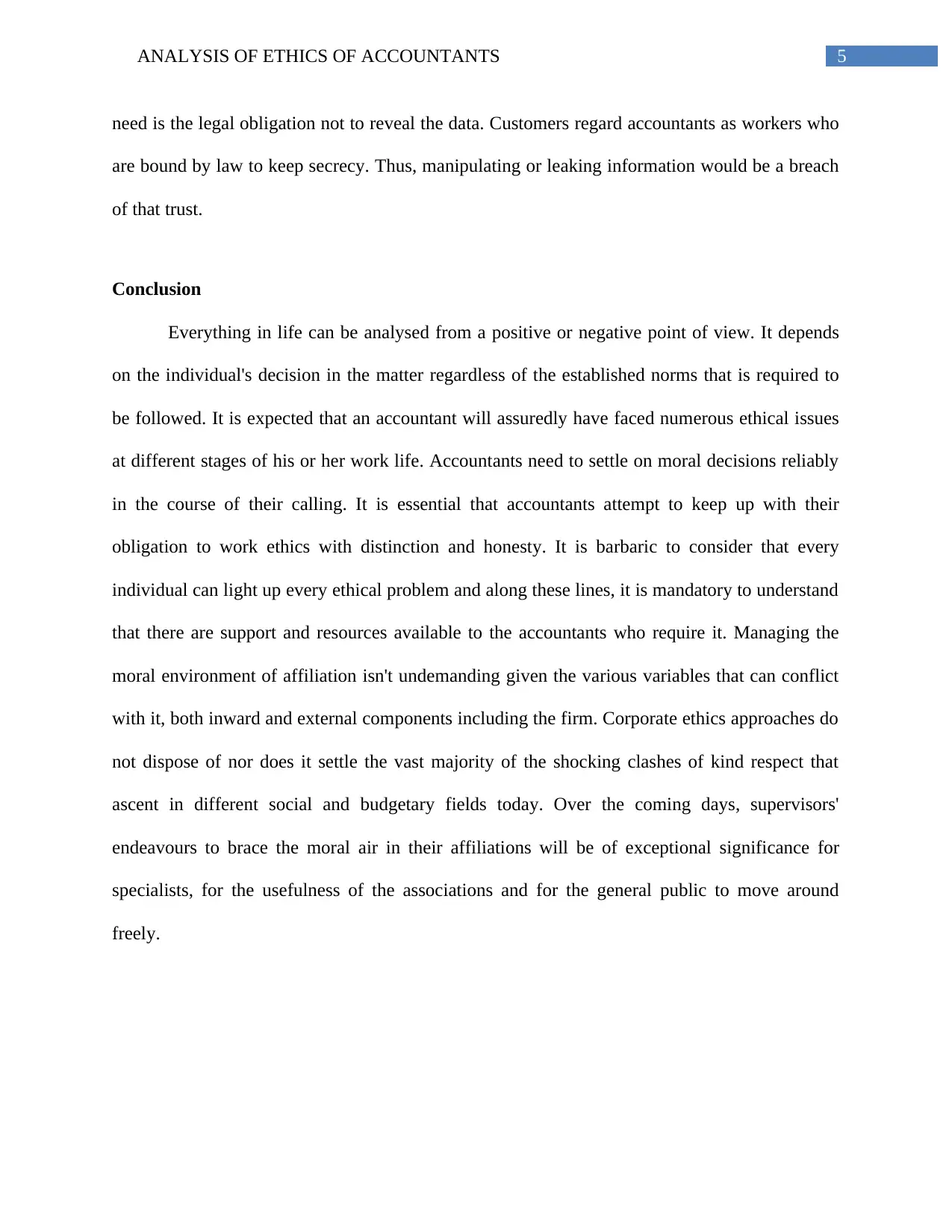
5ANALYSIS OF ETHICS OF ACCOUNTANTS
need is the legal obligation not to reveal the data. Customers regard accountants as workers who
are bound by law to keep secrecy. Thus, manipulating or leaking information would be a breach
of that trust.
Conclusion
Everything in life can be analysed from a positive or negative point of view. It depends
on the individual's decision in the matter regardless of the established norms that is required to
be followed. It is expected that an accountant will assuredly have faced numerous ethical issues
at different stages of his or her work life. Accountants need to settle on moral decisions reliably
in the course of their calling. It is essential that accountants attempt to keep up with their
obligation to work ethics with distinction and honesty. It is barbaric to consider that every
individual can light up every ethical problem and along these lines, it is mandatory to understand
that there are support and resources available to the accountants who require it. Managing the
moral environment of affiliation isn't undemanding given the various variables that can conflict
with it, both inward and external components including the firm. Corporate ethics approaches do
not dispose of nor does it settle the vast majority of the shocking clashes of kind respect that
ascent in different social and budgetary fields today. Over the coming days, supervisors'
endeavours to brace the moral air in their affiliations will be of exceptional significance for
specialists, for the usefulness of the associations and for the general public to move around
freely.
need is the legal obligation not to reveal the data. Customers regard accountants as workers who
are bound by law to keep secrecy. Thus, manipulating or leaking information would be a breach
of that trust.
Conclusion
Everything in life can be analysed from a positive or negative point of view. It depends
on the individual's decision in the matter regardless of the established norms that is required to
be followed. It is expected that an accountant will assuredly have faced numerous ethical issues
at different stages of his or her work life. Accountants need to settle on moral decisions reliably
in the course of their calling. It is essential that accountants attempt to keep up with their
obligation to work ethics with distinction and honesty. It is barbaric to consider that every
individual can light up every ethical problem and along these lines, it is mandatory to understand
that there are support and resources available to the accountants who require it. Managing the
moral environment of affiliation isn't undemanding given the various variables that can conflict
with it, both inward and external components including the firm. Corporate ethics approaches do
not dispose of nor does it settle the vast majority of the shocking clashes of kind respect that
ascent in different social and budgetary fields today. Over the coming days, supervisors'
endeavours to brace the moral air in their affiliations will be of exceptional significance for
specialists, for the usefulness of the associations and for the general public to move around
freely.
⊘ This is a preview!⊘
Do you want full access?
Subscribe today to unlock all pages.

Trusted by 1+ million students worldwide
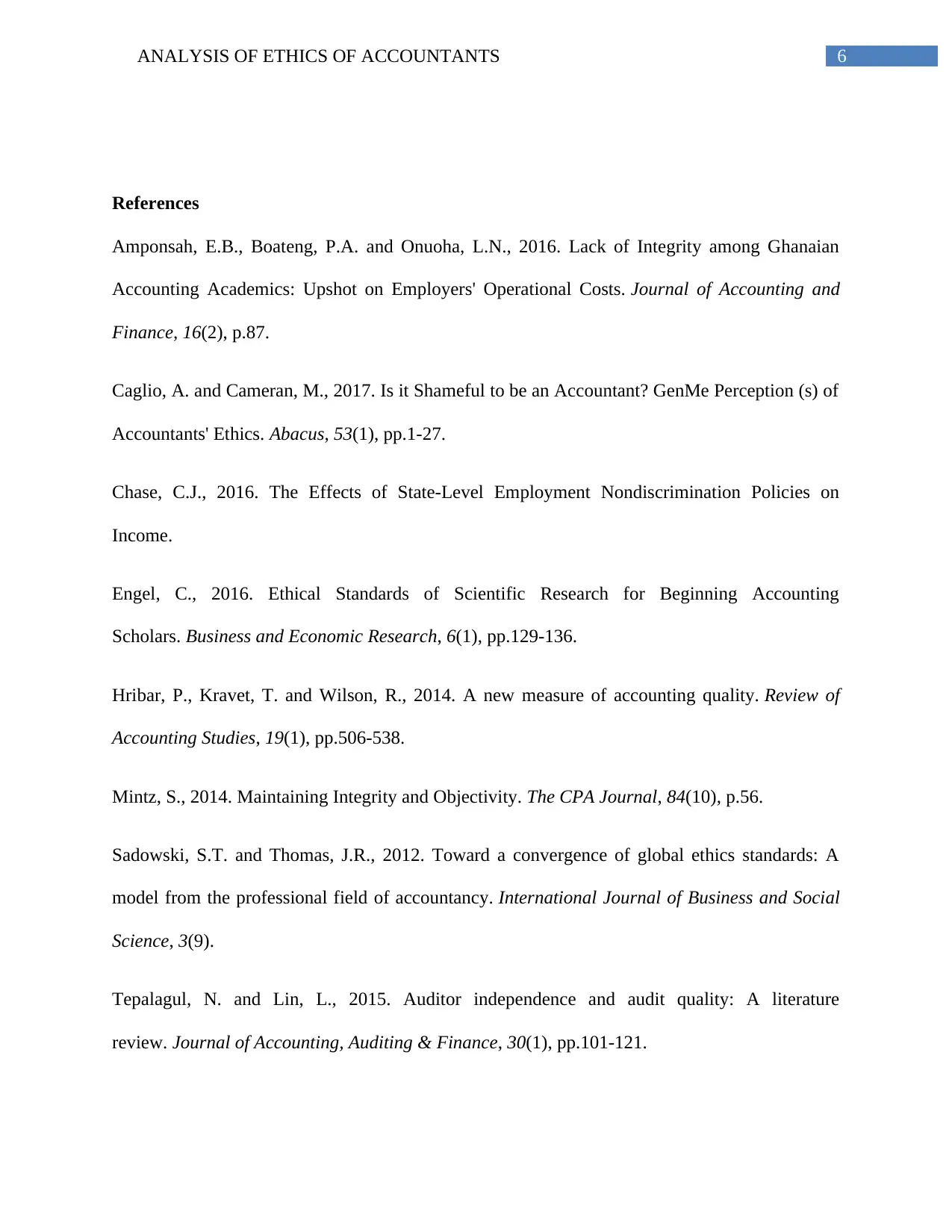
6ANALYSIS OF ETHICS OF ACCOUNTANTS
References
Amponsah, E.B., Boateng, P.A. and Onuoha, L.N., 2016. Lack of Integrity among Ghanaian
Accounting Academics: Upshot on Employers' Operational Costs. Journal of Accounting and
Finance, 16(2), p.87.
Caglio, A. and Cameran, M., 2017. Is it Shameful to be an Accountant? GenMe Perception (s) of
Accountants' Ethics. Abacus, 53(1), pp.1-27.
Chase, C.J., 2016. The Effects of State-Level Employment Nondiscrimination Policies on
Income.
Engel, C., 2016. Ethical Standards of Scientific Research for Beginning Accounting
Scholars. Business and Economic Research, 6(1), pp.129-136.
Hribar, P., Kravet, T. and Wilson, R., 2014. A new measure of accounting quality. Review of
Accounting Studies, 19(1), pp.506-538.
Mintz, S., 2014. Maintaining Integrity and Objectivity. The CPA Journal, 84(10), p.56.
Sadowski, S.T. and Thomas, J.R., 2012. Toward a convergence of global ethics standards: A
model from the professional field of accountancy. International Journal of Business and Social
Science, 3(9).
Tepalagul, N. and Lin, L., 2015. Auditor independence and audit quality: A literature
review. Journal of Accounting, Auditing & Finance, 30(1), pp.101-121.
References
Amponsah, E.B., Boateng, P.A. and Onuoha, L.N., 2016. Lack of Integrity among Ghanaian
Accounting Academics: Upshot on Employers' Operational Costs. Journal of Accounting and
Finance, 16(2), p.87.
Caglio, A. and Cameran, M., 2017. Is it Shameful to be an Accountant? GenMe Perception (s) of
Accountants' Ethics. Abacus, 53(1), pp.1-27.
Chase, C.J., 2016. The Effects of State-Level Employment Nondiscrimination Policies on
Income.
Engel, C., 2016. Ethical Standards of Scientific Research for Beginning Accounting
Scholars. Business and Economic Research, 6(1), pp.129-136.
Hribar, P., Kravet, T. and Wilson, R., 2014. A new measure of accounting quality. Review of
Accounting Studies, 19(1), pp.506-538.
Mintz, S., 2014. Maintaining Integrity and Objectivity. The CPA Journal, 84(10), p.56.
Sadowski, S.T. and Thomas, J.R., 2012. Toward a convergence of global ethics standards: A
model from the professional field of accountancy. International Journal of Business and Social
Science, 3(9).
Tepalagul, N. and Lin, L., 2015. Auditor independence and audit quality: A literature
review. Journal of Accounting, Auditing & Finance, 30(1), pp.101-121.
Paraphrase This Document
Need a fresh take? Get an instant paraphrase of this document with our AI Paraphraser
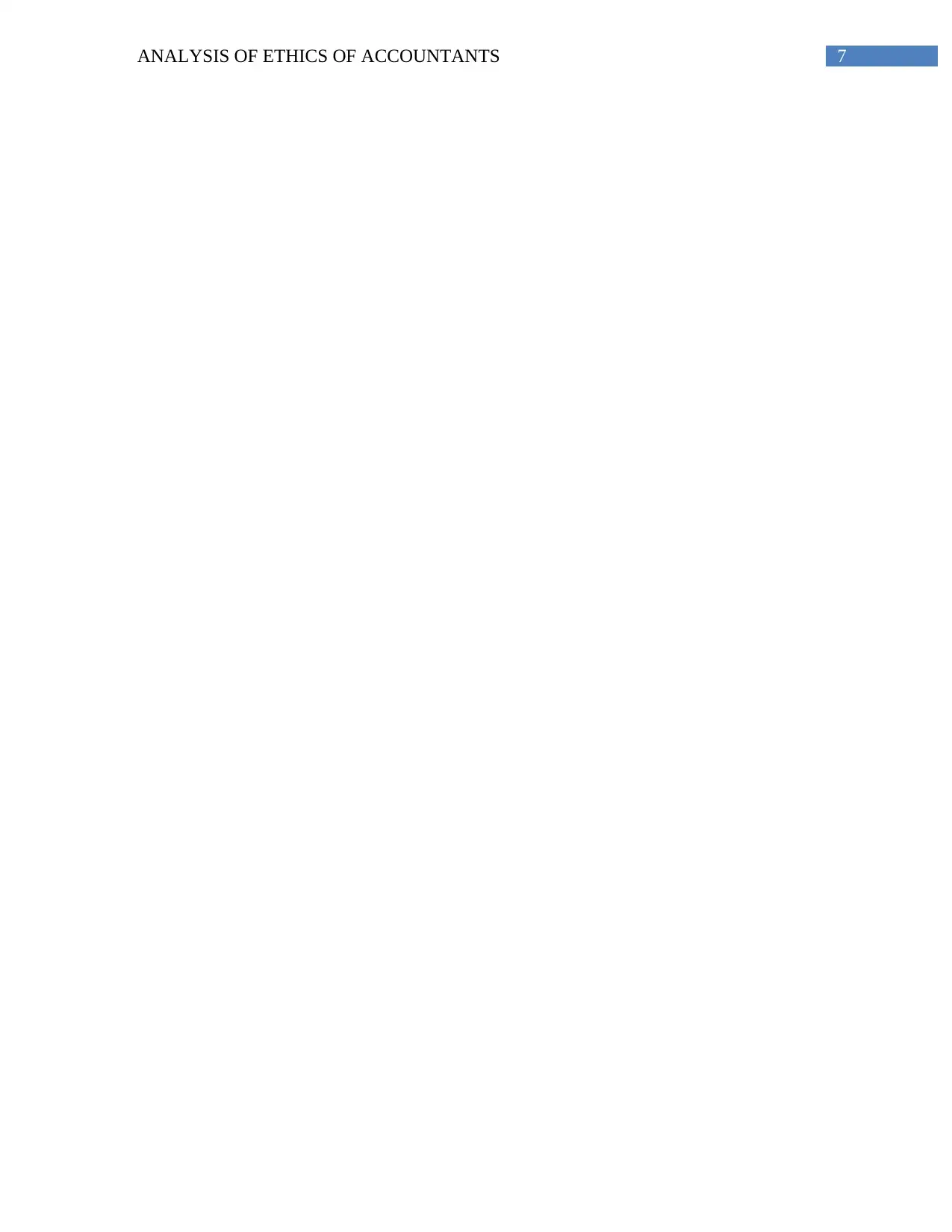
7ANALYSIS OF ETHICS OF ACCOUNTANTS
1 out of 8
Related Documents
Your All-in-One AI-Powered Toolkit for Academic Success.
+13062052269
info@desklib.com
Available 24*7 on WhatsApp / Email
![[object Object]](/_next/static/media/star-bottom.7253800d.svg)
Unlock your academic potential
Copyright © 2020–2026 A2Z Services. All Rights Reserved. Developed and managed by ZUCOL.





